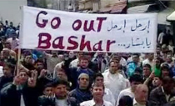Crowdfunding the Syrian revolution

Ten months after the beginning of the Syrian uprising, the world continues to see protestors being killed by their own government. To go beyond the ineffectual international response, a German-based initiative wants to financially help local activists against the Assad regime by crowdfunding them. FutureChallenges talked with Elias Perabo, a founding member of Adopt a Revolution.
Firstly, we want to enable the world’s citizens to support nonviolent Syrian activists in their struggle against the regime. Through our initiative it is possible to choose a concrete local committee and support it financially. The first activists’ committees were founded at the beginning of the uprising in March. They organize the peaceful demonstrations and strength then local civil society, facing great danger.
The money donated through the website is used to keep these committees functional. For example, buying cameras in order to document violations of human rights or obtaining material in order to print flyers, banners, etc. But furthermore, the money is used to help activists in the underground by renting them a secure flat, buying them food and securing their Internet connection.
In addition, we want to increase German society’s awareness of the Syrian Spring. Our initiative should also become a bridge between both civil societies.
 How can you be sure that the money is really arriving to the ones supposed to get it and not funding military groups?
How can you be sure that the money is really arriving to the ones supposed to get it and not funding military groups?
We try to guarantee as much transparency as possible. The coordination of Syrian local committees sent us a list of eligible committees, which absolutely stick to nonviolence. The donated money is smuggled trough the Turkish or Jordanian borders into the country, as no transfers are possible and would be life-threatening for the activists.
In return, the committees have to confirm to us that the money has arrived and give us feedback on how they spent it. Furthermore, they report on our website about the evolution of the uprising.
But, aren’t you interfering in a civil war?
No, in the sense in that we just fund nonviolent resistance. It is a capital priority for us. With the exception of the rebel Syrian army, the Syrian uprising has been peaceful, even during the worst times of repression. We want to give to the Syrians the possibility to continue this exemplary nonviolent struggle.
How successful is the initiative?
We launched the website three weeks ago and the success has exceeded our expectations. Actually, we work with a system of sponsorship: We don’t ask to necessarily donate a big amount of money, but to support a specific committee by sending every month a certain amount. We already found 350 sponsors who can support 15 local groups in Syria. The first money transfer to the coordination group in Beirut will be achieved by the end of this week.*
How did the initiative started?
I’m no specialist of the region, but I travelled twice to Syria and Lebanon in March and April last year. During these trips I met Syrian activists in Beirut, who were forced to leave their country because of their ideas and continued the struggle from abroad. In May, I decided to quit my job in Germany in an environmental NGO and to come back to help them out with their international media work.
In September, we were thinking of how to involve the European civil society in helping the Syrian uprising, and we came up with this. Now, I’m back here in Germany working on a voluntary basis for Adopt a Revolution.
What do you expect from politics to solve the Syrian crisis?
On one side, Germany and other European states have to increase their diplomatic pressure on the Syrian regime and, on the other side, bring humanitarian help for refuges in the neighboring countries.
They also have to act on Turkey, Russia and China so that they modify their position towards Syrian. To pressure has to come for the outside and from the inside. It’s the best way to provoke the end of the regime. A military intervention would be a catastrophe. We don’t need a second Libya!
* Adopt a Revolution didn’t communicate the total amount of the transfer.
Elias Parebo is a 31-year-old political scientist, who was travelling through Syria in April 2011 as the Syrian Spring broke out. He experienced how the country changed from one day to the other and how people lost their fear to take the streets. He was involved in the press work of Syrian activists and created a network of contacts for ‘Adopt a Revolution’.
pictures (c): www.adoptrevolution.org
Tags: arab spring, crowdfunding, democracy, syria

